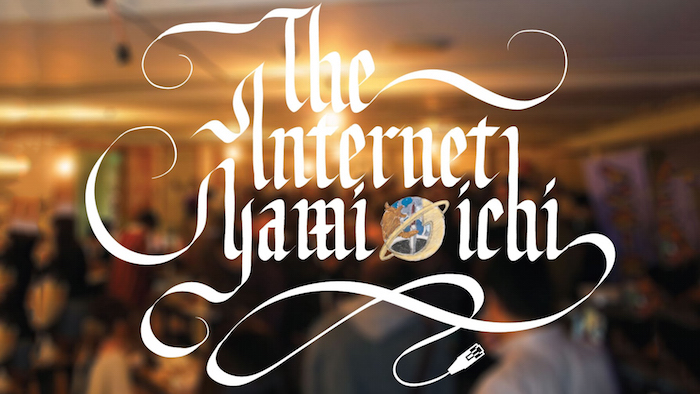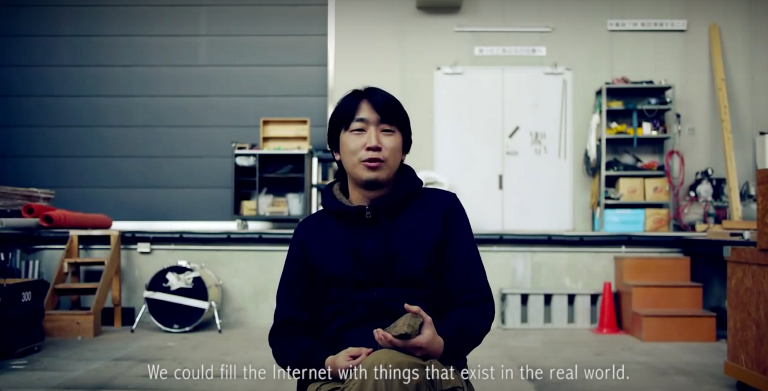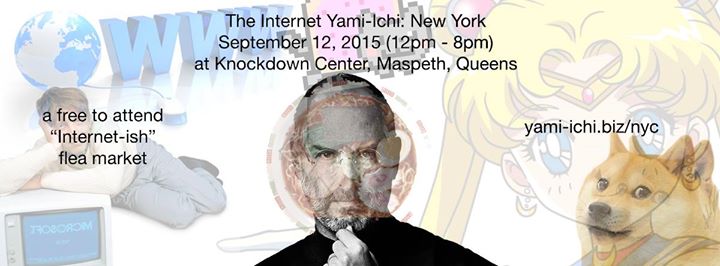Interview responses translated from Japanese by Love Kindstrand.

"Welcome to [...] the Internet's next wave," Sue Halpern wrote in 2014, "the Internet of Things"—a harbinger of our gradual transition into "one of the things connected to and through the Internet."
Yet, despite its sizeable implications for politics, capital, and consumers, the internet of things has not affected web-based art practices to the same degree. In fact, more and more contemporary internet artists are expressing interest in a somewhat opposing phenomenon, a trend that flips the logic of the Internet of Things on its head. From Paul Soulellis's Library of the Printed Web to Michael Mandiberg's Print Wikipedia, artists working on the internet and digital technologies seem less absorbed by the link between physical bodies and virtual networks than by the physical bodies of these networks—that is, by the matter of the web. As a result, what net art usually offers up is not so much the Internet of Things as the things of the internet.
The Internet Yami-Ichi is one gripping example of recent artistic experimentations with the materiality of the web. Created by the Japanese artist collectives IDPW (pronounced "i-pass") and Exonemo, the Yami-Ichi is a real-life counter-market for internet-related goods. Somewhere between "flea" and "black," the Yami-Ichi is at once both and neither: "In Japanese," Exonemo tells me, "the word 'yami' in 'yami-ichi' (black market) carries connotations not only of darkness, but also of 'sickness' and 'addiction,' in the sense of being too attached to something. More than just a market, we imagined the Yami-Ichi as a place where people consumed by the internet could come together."
The project's first installation was held in Tokyo on November 4, 2012 and attracted over 500 people interested in selling, buying, and trading truly unique internet objects. Since then, the Yami-Ichi has attracted much international attention, travelling to Berlin, Taichung, Seoul, Linz, Brussels, and Amsterdam. In the interview that follows, I ask Exonemo about the politics of their project, touching on the history of online consumer capitalism, Silk Road, the corporatization of Web 2.0, digital labor, and the meaning of liberty on the internet.


Tomoya Watanabe (aka Tomorrow Shark) in Back streets of the Internet (2013) produced by W+K 東京LAB.
LP: Right now I'm at the Rhizome office in the New Museum, less than a mile away from the federal courthouse on Pearl Street where the founder of Silk Road, Ross Ulbricht, was sentenced to life in prison on May 29, 2015. In a letter to Judge Katherine B. Forrest right before his sentencing, Ulbricht said he created Silk Road because he believed "people should have the right to buy and sell whatever they wanted so long as they weren't hurting anyone else." While you explicitly prohibit the exchange of dangerous and illegal goods, you also seem to frame the Internet Yami-Ichi as a project to "liberate" the web by promoting the freedoms of internet users in the form of consumers, producers, and merchants. Were you and Ulbricht responding to a similar problem, namely the lack of liberty on the internet, but in different ways? While Ulbricht's libertarian solution focused on individual liberties as market freedoms, your answer seems to be grounded in the idea of communal liberty as human interaction.
e: With Silk Road, you see one attempt to reclaim the liberty once inherent to the internet that has since been lost, by creating an unregulated space within the internet itself. In contrast, the Internet Yami-Ichi is a proposal to withdraw from the internet "for the time being." The Yami-Ichi takes "internet addiction" as one of its themes, specifically by enacting a collectivity of selves still very much enraptured by the internet, gathering in real life to show each other the many internets we've all imagined/conjured up. Rather than creating "a space for free exchange," what we imagined is what I'd call "a flock of grotesque creatures emerging from the internet, giggling at the sight of themselves interacting in the same grotesque manner in real life"—and as such it felt like an entirely new perspective.
At the first event in Tokyo, we mostly invited people from our respective communities, so there was a strong atmosphere of people sharing the same sense of reality coming together. But when we gathered for the third time in Berlin the concept just took shape in a way that convinced us that people all over the world share a similar awareness: while no doubt people felt differently in various places, the sense of the internet as "something new" shared almost simultaneously across the world is fascinating.
LP: From its inception, the internet has been intimately connected with the development of postindustrial capitalism (and vice-versa). E-commerce websites like eBay and Amazon have been leading internet marketplaces since 1995, the same year Craig Newmark started Craigslist as an email newsletter for promoting events around the Bay Area. By 1999, the Argentinean MercadoLibre had appropriated the concept of a "free" online market as the website's brand name. More recently, Etsy and DaWanda have combined the personalized and user-generated aspects of social media websites into their corporate interfaces, allowing users to create their own online stores and sell "unique," often handmade commodities. What would you say is the place of the Yami-Ichi in the history of online market capitalism?
e: The biggest difference between eBay, Etsy and the other e-commerce sites you mention on one hand, and the Yami-Ichi on the other, is that the former seize on the convenience of the web in order to provide the most accessible service, while the Yami-Ichi does the complete opposite. The things that appear for sale at the Yami-Ichi are preliminary responses to our question of what constitutes an "internet-like" thing, but it's not as if the people selling them do so normally or try to make a livelihood out of doing so. The people who buy them, in turn, earn their own answers to the question of what an "internet-like" thing would actually mean, or perhaps they come with that in mind. In other words, the action of buying and selling in the Yami-Ichi is less an economic one, and rather entails a kind of media research that parodies the action of economic exchange. In an age where getting by without accessing the internet is becoming difficult or impossible, the nature or meaning of that thing we call "the internet" is seldom questioned. The Yami-Ichi constitutes a kind of meditation on that condition, with the actual act of exchange being more of an auxiliary thing, serving to reinforce that reality. Of course, this is nothing more than my personal thoughts on the matter, and presumably other people participate with different conceptions of what they are doing and why.

Poster for the Yami-Ichi in Amsterdam earlier this year
LP: Are market freedoms, as in the liberties afforded to consumers in a capitalist economy, an important aspect of being free in general, especially as this idea is conceived on the internet today?
e: One reason for running the Yami-Ichi in Japan—and it might not be much different from other places in this regard—was as a challenge to the commonplace notion that "one does not pay for internet things." It wasn't long ago that you could find anything for free on the net, and online commerce suffered as a result. Recently things are changing somewhat, particularly due to increasingly aggressive strategies by major corporations, but there is a certain irony to paying actual money for things derived from internet culture at the Yami-Ichi that remains interesting. Few people in Japan, for example, will give money to a homeless person—even street musicians have a hard time. In light of this tendency to "only pay for what benefits" you directly, paying money for non-beneficiary, even useless things at the Yami-Ichi starts to appear as a critical act. At the Berlin event, some participants noticed that people were reluctant to get their wallets out, and in this way there are cultural connotations to simple acts of buying and selling. I'm really curious to see what happens when we open in New York City, where tipping for services and so on suggests an entirely different culture of money exchange.
LP: Despite their dependence on the free digital labor of their users, corporate social media websites, such as Facebook and Twitter, brand themselves as service providers and social utility platforms. While this may very well be true, their self-understanding as service suppliers elides, quite deliberately of course, the identity of their users as producers of internet content, that is, as workers rather than customers. By allowing internet users to sell their online content as real products, by providing them the opportunity to be remunerated for their digital labor, do you think the Internet Yami-Ichi works to redress the injustices of free digital labor on the internet?
e: If you ask the participants selling things at the Yami-Ichi, they'll tell you how differently people communicate here compared to the exhibitions where they usually show their ideas and creations. Sell or no sell, the creator is immediately confronted with the question of how much their idea is worth, and the customer's response is immediate. With art, there is a certain anxiety in discussing the merits or demerits of a specific work in the conversation between artist and audience. At the Yami-Ichi, it is possible to talk about this in terms of an objective standard: is this worth five bucks or not? For the seller, it seems it's become an appreciated opportunity for casually questioning their own work.
LP: For the first Internet Yami-Ichi, you stipulated only one criteria for sellers: "to sell things that have something to do with the Internet." As a result a diverse mix of unique internet-based objects were on display, including the hand-crafted (and live recorded) ringtone, the "Real-World Re-Tweet," the "Spacer .gif," and a host of other fascinating historical and contemporary fragments of "web matter." While the majority of items on sale appeared to be born-digital goods or services morphed into a real-world format, one of the participants, Tomoya Watanabe (aka Tomorrow Shark), did the precise opposite of this. Watanabe sold real-life stones accompanied by a CD-ROM with their 3D scan data. In doing this, he took an organic object, digitized it, and sold both versions, the physical stone and its digitally-rendered image. So, in a way, the Yami-Ichi offers users not only the possibility to bring things from the web into the physical world, but also the prospect of adding real-life objects to the internet, "filling the internet with things that exist in the real world," as he put it.
e: The novelty of Tomorrow Shark's "stone" lies, as you explain, not in the idea of bringing a thing from the internet into real space, but in tying a material object to its three-dimensional data, a presence that connects net and physical realities. There is something romantic in the encounter between the novel, still unstable entity that is "the internet," and the ordinary rock, present anywhere and everywhere as a symbol of universality. The fantasy of that same rock selling out simultaneously in every corner of the world is perhaps equally romantic...

* * *
LP: How did IDPW and the Internet Yami-Ichi come about?
e: After the earthquake, tsunami, and nuclear disaster that occurred in Japan in 2011, the two of us in Exonemo left Tokyo for Fukuoka in Western Japan. Around that time, a lot of people were leaving the city for the countryside, or even going overseas. In Fukuoka, we rented a warehouse with the intent of starting something new. That's where the IDPW collective came together, as a way to gather all the fellow artists scattered across Japan in an extension of Exonemo's focus on "experiments that connect internet and reality."
The idea was to have the internet "descend" into reality around that actual space (genba), and around that concept we started, in different places and shapes, online and offline, irregularly and experimentally—and with a fair amount of stupidity—to organize the parties where the Internet Yami-Ichi first took shape.
LP: What were some of the most influential referents for the Yami-Ichi?
e: The primary referent for this kind of flea market event is Tokyo's Comic Market (or Comike). Since 1975 it has grown from a small subcultural gathering to an annual gathering of 500,000 enthusiasts. Beyond manga and anime-related works, you'll encounter countless items and ideas for sale that don't quite fit any category: a map of vending machines in Akihabara; homemade recipes; a bot that plays through pornographic computer games, and so on. It's stuff that's obviously useless for most people, and yet there is the provocation of coming face to face with that kind of pure creativity. In 2005, this inspired another community of enthusiasts called Dorkbot Tokyo, organized around "people doing strange things with electricity," who put together a flea market-style event that attracted serious attention. The combination of all these things eventually led to the Internet Yami-Ichi events.
LP: Given how the idea for the Yami-Ichi was born out of Apple's rejection of your proposed iPhone app, was your initial idea to host a web-based, as opposed to a physical, marketplace? Or, was the app meant to be a digital platform for organizing people only and then trade objects IRL?
e: Once we realized we couldn't sell on the App Store the silly idea of selling apps by connecting people's phones to our development PC came to mind—the ridiculousness of it fascinated us, I guess. So for the Yami-Ichi we didn't think about online sales at all. At the first two events we didn't even have wifi! Yet in that space entirely cut off from the internet, we were enveloped by an "internet-like" atmosphere—in turn prompting the question of whether this thing we call "the internet" has anything to do with being connected to the internet at all.
In the beginning, we knew we wanted to bring the internet into the flea market, but still couldn't imagine what kind of space would emerge from that encounter. That's when we came up with the idea of taking the app, that had already been rejected by Apple, and selling it by connecting a cable directly to people's phones. This lead to the realization that "perhaps the current internet is less free than the real world."
The early days of the internet were characterized by an understanding of its possibilities as that of a space completely separated from physical reality. More recently, the internet has become more convenient to use even as it falls under the control of global corporations, and as its use becomes more universal it has become a matter of public concern. With increasing privacy concerns we've come to feel the limits of online practice. Now, with the spread of smartphones the internet is no longer distinguishable from reality, the very distinction disappearing bit by bit as the problematics of online life encroach on reality itself. The present condition challenges us to take a step back from the internet, reappraise the way it has affected our sense of values and provided new concepts, and from there, consider the way we want technological innovation to proceed.
LP: In light of your project's success, do you think you'll submit a new proposal for an iPhone app to Apple in the future?
e: I don't know about the App Store—as an embryo of the idea that became the Internet Yami-Ichi, our rejected app has already made itself useful. We'll continue to release different apps and other works as exonemo in the future.

Fabien Mousse, Real Internet Art (2013)
LP: What is the most popular currency of exchange at the Yami-Ichi? Do people use bitcoins, instagram followers, tumblr accounts, gifs, image macros, etc. to buy/trade goods, or is mostly cash?
e: It's been mostly cash so far; people write price tags for "1 euro" or "1 bitcoin" as a joke, and it seems like participants trade their goods. In the US, there are plenty of convenient options for payment like Paypal, Square and Venmo, so that might change.
LP: What are your plans for the future of the Yami-Ichi?
e: This summer, we've held events in Taichung (Taiwan), Seoul, Linz (Austria), and will be in New York City on September 12; towards the end of the year, we're thinking of Scotland, São Paulo, and London as well as Indonesia and Mexico. Early on, IDPW was involved in organizing all events, but since the one held in Amsterdam last May we've pulled back a little bit, moving towards an open platform through which anyone can participate.
The question is how the internet, as a phenomenon unfolding in the present on a global scale, is acted upon differently in different parts of the world. There's a lot of work organizing these Yami-Ichi markets across the world, but for the moment it feels like a meaningful activity that I want to continue in the future.
The very notion of "the internet" will keep changing, now and in the future, as will the idea of what's considered "internet-like" or not. We're still at a point where drawing a line between "reality" and "the internet" allows us to understand something, but the line separating these two domains is disappearing. Soon, the Internet Yami-Ichi might look no different from an ordinary flea market! The Yami-Ichi event itself, I hope, already functions as a kind of barometer with which to gauge and comprehend our changing times.

The Internet Yami-Ichi is coming to New York on Saturday, September 12, 12pm-8pm at Knockdown Center, Queens (website / Facebook event).
Interview responses translated from Japanese by Love Kindstrand. Kindstrand is a doctoral student in anthropology at the University of Chicago, interested in intersections of anonymity and subjectivity in internet culture.

